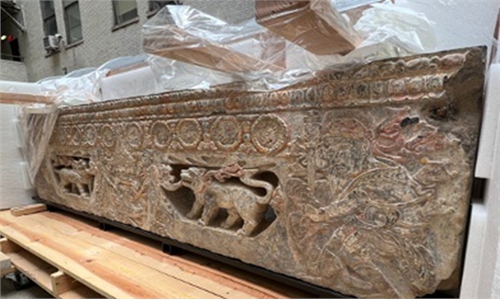ARTS / ART
China-Germany program shows the way to relic repatriation

Illustration: Liu Xiangya/Global Times
Due to obstacles such as the limited binding force of international conventions concerning the repatriation of lost historical relics, especially those stolen by Western colonial forces, many lost relics have become prisoners in a battle of "accuser vs accused," causing them to be unable to fulfill their role of educating the public and connecting humanity through exhibitions.It would be shortsighted for us to refuse to look into the value of looted relics just because we hate the fact that disputes between countries over their repatriation won't be over anytime soon.
What we need is a new way to communicate, just like the recent collaboration between Germany and China that saw the two countries revisit artifacts looted during China's Boxer Rebellion, a populist uprising around 1900.
Initiated by seven German museums, including those belonging to the prestigious Berlin State Museums, the collaboration saw the participation of China's Palace Museum and Shanghai University.
The goal of the project was to determine which of the thousands of relics in German collections were looted and smuggled during the Boxer Rebellion.
The Boxer Rebellion was an anti-colonial movement that started at the end of the 19th century before the invasion of the Eight-Nation Alliance.
"More than 10 million artifacts" were stolen from China at the time, relic expert Xiang Zhengming told the Global Times.
Germany was a member of the Eight-Nation Alliance that invaded China and resulted in the numerous losses and damage to Chinese cultural treasures.
Perhaps due to a sense of its own shame or pressure from the international community, Germany seems to have awakened from its colonial experience as it is seeking to extend an "olive branch" in the field of relic repatriation.
Influenced by the post-colonist museology ethics that began forming in the 1960s, some Western scholars have been advocating to "bring relics back to their own countries."
Their calls have "led the Western political world to eventually have to think about returning relics to underdeveloped countries," Western museolgy expert Li Zhuo said.
"Our project paves the way for the repatriation of looted objects," said Christine Howald, a core researcher of the China-Germany project, which she called of "global importance."
If every intellectual in the Western community was fair-minded, international repatriation disputes probably would have ended long ago.
Yet with cases such as the British Museum's blatant disregard of Egypt's calls for the return of its Rosetta Stone, it seems these seesaw battles will continue until these countries are forced to return lost relics.
Millions of cultural relics and treasures in China were smuggled out of the country through illegal means in modern times. Such relics have become the pearl of many museums in Western countries.
These museums should realize that these collections are the results of colonialism, and the best choice is to safely return them to their homes.
With its increased discourse power and growing reputations in the cultural heritage field, China is more than capable of hosting the relics it once lost to foreign looting.
In recent years, China took the initiative to sign bilateral agreements or memorandums of understanding with more than 20 countries such as the UK, Italy and France and tracked down more than 1,800 lost cultural relics. This is just the beginning.


